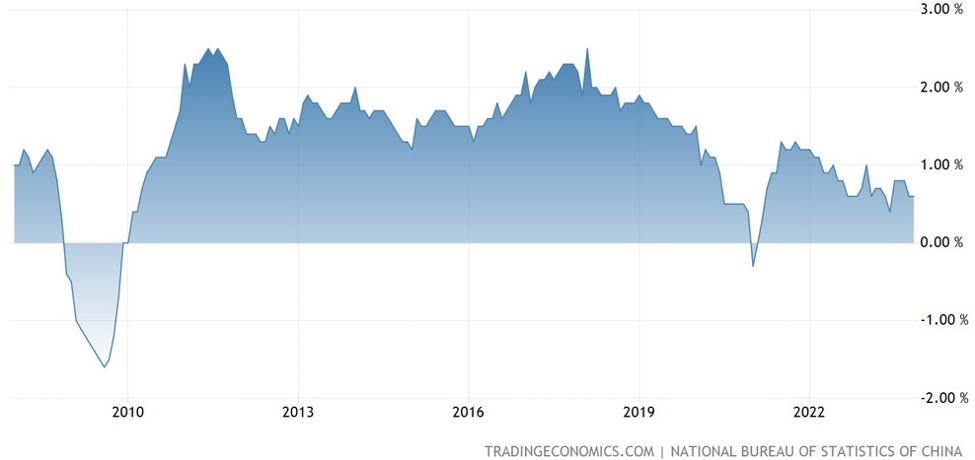UPCOMING
EVENTS:
- Monday: China Retail Sales and Industrial Production,
Japan/Eurozone/UK/US Flash PMIs. - Tuesday: UK Employment report, Canada CPI, US Retail
Sales, US Industrial Production and Capacity Utilization, US NAHB Housing
Market Index. - Wednesday: UK CPI, US Housing Starts and Building Permits,
FOMC Policy Decision, New Zealand Q3 GDP. - Thursday: BoJ Policy Decision, BoE Policy Decision, US
Final Q3 GDP, US Jobless Claims. - Friday: Japan CPI, PBoC LPR, UK Retail Sales, Canada
Retail Sales, US Core PCE.
Monday
Monday will be the
Flash PMIs Day with a particular focus on the Eurozone, UK and US PMIs as they
could influence the market’s expectations around interest rates.
- Eurozone Manufacturing PMI: 45.3 expected vs. 45.2
prior. - Eurozone Services PMI: 49.5 expected vs. 49.5
prior. - UK Manufacturing PMI: 48.2 expected vs. 48.0
prior. - UK Services PMI: 51.0 expected vs. 50.8 prior.
- US Manufacturing PMI: 49.8 expected vs. 49.7
prior. - US Services PMI: 55.7 expected vs. 56.1 prior.
PMI
Tuesday
The UK Employment
in the three months to October is expected at -12K vs. 219K prior, while the
Unemployment Rate is expected to remain unchanged at 4.3%.
The Average
Earnings Ex-Bonus is expected at 5.0% vs. 4.8% prior, while the Average Earning
including Bonus is seen at 4.6% vs. 4.3% prior.
This report is
unlikely to change the market’s expectations for the BoE to remain on hold this
week unless we see huge downside deviations from the forecasts, especially on
the wage growth side.
UK Unemployment Rate
The Canadian CPI
Y/Y is expected at 2.0% vs. 2.0% prior, while the M/M figure is seen at 0.1%
vs. 0.4% prior. The Trimmed-Mean CPI Y/Y is expected at 2.6% vs. 2.6% prior,
while the Median CPI Y/Y is seen at 2.4% vs. 2.5% prior.
The BoC recently dropped the line saying “if the economy evolves broadly in line with
our latest forecast, we expect to reduce the policy rate further”, which
suggests that we reached the peak dovishness and the central bank will now
switch to 25 bps cuts and will slow the pace of easing.
Canada Inflation Measures
The US Retail
Sales M/M is expected at 0.5% vs. 0.4% prior, while the ex-Autos M/M measure is
seen at 0.4% vs. 0.1% prior. The focus will be on the Control Group M/M figure
which is expected at 0.4% vs. -0.1% prior.
Consumer spending
has been stable which is something you would expect given the positive real
wage growth and resilient labour market. We’ve also been seeing a strong pickup
in consumer sentiment/confidence reports which suggest that consumers’
financial situation is stable/improving.
US Retail Sales YoY
Wednesday
The UK CPI Y/Y is
expected at 2.6% vs. 2.3% prior, while the M/M figure is seen at 0.1% vs. 0.6%
prior. The Core CPI Y/Y is expected at 3.6% vs. 3.3% prior, while the Services
CPI Y/Y is seen at 5.1% vs. 5.0% prior.
As previously
mentioned, the data is unlikely to change the market’s expectations for the BoE
to remain on hold this week unless we see huge downside deviations from the
forecasts. The market sees an 87% probability of no change at this week’s BoE’s
decision and roughly three 25 bps cuts in 2025.
UK Core CPI YoY
The Fed is
expected to cut by 25 bps bringing the FFR to 4.25-4.50%. We will also get the
updated Summary of Economic Projections (SEP) where growth and inflation should
be revised upwards, and the Dot Plot will likely show two rate cuts in 2025.
Fed Chair Powell should acknowledge the strength in the US data and announce a
slowdown in the pace of easing.
This should be
already priced in as the market expects just two rate cuts in 2025 with the
first one coming in March at the earliest. Therefore, market participants will
look for deviations from the expectations and the data in Q1 2025 will have the
final say.
Federal Reserve
Thursday
The BoJ is
expected to keep interest rates unchanged with the market pricing a 77%
probability for such a move. A couple of weeks ago a rate hike was the most
probable action but the chances dwindled as the JPY strengthened.
The data has been
in favour of a hike but not really screaming for it. The recent “leaks” talked
about the BoJ seeing little cost in waiting, so the market switched its focus
to the January’s meeting, although there are higher chances for a hike in March.
The focus will be
on the forward guidance with the market participants taking clues from Governor
Ueda’s Press Conference.
Bank of Japan
The BoE is
expected to keep the Bank Rate unchanged at 4.75%. Dhingra is expected to be
the lone dissenter. The recent inflation data came on the hotter side and BoE
speakers seem to be in favour of “gradual” easing which point to a rate cut
every quarter, as touted already by Governor Bailey.
Bank of England
The US Jobless
Claims continues to be one of the most important releases to follow every week
as it’s a timelier indicator on the state of the labour market.
Initial Claims
remain inside the 200K-260K range created since 2022, while Continuing Claims
continue to hover around the cycle highs.
This week Initial
Claims are expected at 229K vs. 240K prior, while there’s no consensus for
Continuing Claims at the time of writing although the prior release saw an
increase to 1886K vs. 1871K prior.
US Jobless Claims
Friday
The Japanese Core
CPI Y/Y is expected at 2.6% vs. 2.3% prior. We saw already the Tokyo Core CPI
beating expectations, so it shouldn’t influence market expectations too much
although an upside surprise after a potentially hawkish BoJ hold could give the
JPY a boost.
Japan Core CPI YoY
There are no
expectations for the LPR setting by the PBoC although given the recent shift
announced by the Politburo, we could see big rate cuts which would be the first
concrete step for “moderately loose” monetary policy.
PBoC
The US PCE Y/Y is expected
at 2.5% vs. 2.3% prior, while the M/M measure is seen at 0.2% vs. 0.2% prior.
The Core PCE Y/Y is expected at 2.8% vs. 2.8% prior, while the M/M figure is
seen at 0.1% vs. 0.3% prior.
Forecasters can
reliably estimate the PCE once the CPI and PPI are out, so the market already
knows what to expect. Therefore, unless we see a deviation from the
expected numbers, it shouldn’t affect the current market’s pricing.
US Core PCE YoY















